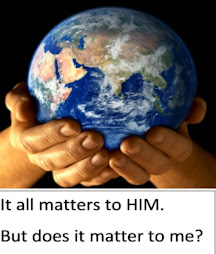Can you imagine it? The nation of Israel was use to regular contact with God – even if they didn’t always like what they heard. But then the prophet Malachi spoke. He spoke judgment on the people and their leaders. Through Malachi, God declared that Israel was profaning His name. Malachi 1:10 says:
"Oh, that one of you would shut the temple doors, so that you would not light useless fires on my altar! I am not pleased with you," says the LORD Almighty, "and I will accept no offering from your hands. 11 My name will be great among the nations, from the rising to the setting of the sun. In every place incense and pure offerings will be brought to my name, because my name will be great among the nations," says the LORD Almighty.
God calls them out for bringing injured, crippled, or diseased animals. He calls out the priests whose teaching, rather than building up the people, has caused them to stumble. He calls out the nation of Israel for marrying the daughter of a foreign God.
But then comes a promise that Israel has heard before in Malachi 3:1. "See, I will send my messenger, who will prepare the way before me. Then suddenly the Lord you are seeking will come to his temple; the messenger of the covenant, whom you desire, will come," says the LORD Almighty. And in Malachi 4:1-3 1 "Surely the day is coming; it will burn like a furnace. All the arrogant and every evildoer will be stubble, and that day that is coming will set them on fire," says the LORD Almighty. "Not a root or a branch will be left to them. 2 But for you who revere my name, the sun of righteousness will rise with healing in its wings. And you will go out and leap like calves released from the stall. 3 Then you will trample down the wicked; they will be ashes under the soles of your feet on the day when I do these things," says the LORD Almighty.
It is what they have been longing for years and years and years. It is promised again. How their hearts must have leapt!
But then another warning at the very end of Malachi: 1 "Surely the day is coming; it will burn like a furnace. All the arrogant and every evildoer will be stubble, and that day that is coming will set them on fire," says the LORD Almighty. "Not a root or a branch will be left to them. 2 But for you who revere my name, the sun of righteousness will rise with healing in its wings. And you will go out and leap like calves released from the stall. 3 Then you will trample down the wicked; they will be ashes under the soles of your feet on the day when I do these things," says the LORD Almighty.
And then, probably the most terrifying thing that had ever happened, happened to Israel. God was silent to the nation for 400 years.
So, what happened over those 400 years? Scripture is silent there. But my guess is that the remnant that God speaks of elsewhere in Malachi was faithful. They kept the stories alive. The people must wait for the Messiah. They must remain faithful even in the time of silence. They had to hold on to hope.
- What is hope? I looked it up on Wikipedia. This is some of what I found. I’ve included the parts that I think are applicable to Biblical hope:
- Hope implies perseverance. Hope is holding on when you cannot see the outcome. For some of us, that holding on is like being in a tug of war. We strain against that which would pull us down. For others of us, we are holding onto a life line – maybe the side of a cliff and struggling to wait for our rescuer. (We’ve probably all been there at times in our lives.)
- “Hope is often the result of faith in that while hope is an emotion, faith carries a divinely inspired and informed form of positive belief. Hope is typically contrasted with despair, but despair may also refer to a crisis of faith . . . . hope caries a connotation of being aware of a spiritual truth.”
Today, at church, Mark Savage spoke about Mary being a person of faith. He sees this in her response to the angel telling her that she will bear the Son of God. Hers is one of immediately submitting to God’s will. There is not questioning, no “How can this be?” or “What will people think?” And she would have had a legitimate worry as to what people might think! If she was believed to be an adulteresses (and she might have been seen this way because being betrothed was being married without the physical relationship), she could be stoned. Honestly, I think that would have worried me. But Mary completely and immediately submits to something she cannot have fully comprehended.
It is faith, but it is also hope. It is hope because it shows that even though God had been silent for 400 years, Mary still chose to believe that God would fulfill his promise. She was part of Israel, hanging on to the edge of the cliff waiting for a rescuer, a redeemer. Faith and hope is what kept Israel believing the Messiah would come. Faith and hope is what made Mary answer the way she did: "I am the Lord's servant," Mary answered. "May it be to me as you have said."
May we all have the faith and hope of Mary at the this holiday season.















No comments:
Post a Comment